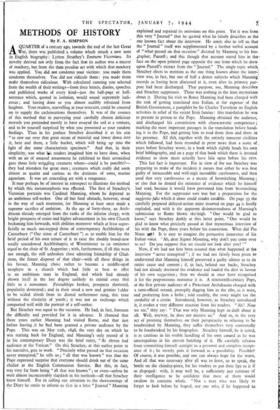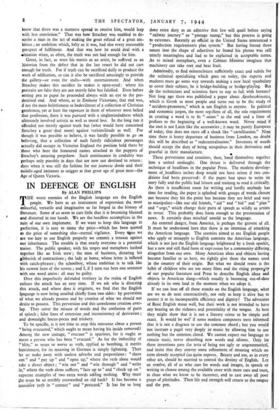METHODS OF HISTORY
By F. A. SIMPSON
AQUARTER of a century ago, towards the end of the last Great War, there was published a volume Which struck a new note
in English biography: Lytton Strachey's Eminent Victorians. Its novelty derived not only frorta,the fact that its author was a master of mockery, but from the then-.peculiar art with which that mockery was applied. You did not condemn your victims: you made them condemn themselves. You did not ridicule them: you made them make themselves ridiculous. With calculated cunning you selected from the wealth of their writings—from their letters, diaries, speeches and published works of every kind—just the half-page or half- sentence which, quoted in isolation, would sound supremely ludi- crous ; and having done so you almost audibly refrained from laughter. Your readers, marvelling at your restraint, could be counted on to supply the cachirmations themselves. It was of the essence of this method that in purveying your carefully chosen delicious morsels you pretended merely to have assayed the soil at a venture, and to be yourself surprised by what you presented as your random findings. Thus in his preface Strachey described it as his aim " to row out over that great ocean of material and lower down into it, here and there, a little bucket, which will bring up into the light of day some characteristic specimen." And that, in their simplicity, was what leis readers imagined him to have done, when with an air of amused amazement he exhibited to their astonished gaze those little wriggling creatures whom—could it be possible?— they had mistaken for great men ; creatures which really did seem almost as quaint and curious as the denizens of some, marine aquarium. It was art concealing art with a vengeance.
It may perhaps be of interest in retrospect to illustrate the method by which this metamorphosis was effected. The first of Strachey's Victorian portraits was Cardinal Manning, whom he depicted as an ambitious self-seeker. One all but fatal obstacle, however, stood in the way of such treatment, for Manning at least once made a supreme sacrifice of ambition. At the age of forty-three, an Arch- deacon already emerged from the ranks of the inferior clergy, with bright prospects of easier and higher advancement in his own Church beckoning him forwards, with abilities moreover which at least super- ficially so much out-topped those of contemporary Archbishops of Canterbury (" Our sister of Canterbury ") as to enable him for the brief period of his own tenure of it to raise the shoddy brand-new totally unendowed Archbishopric of Westminster to an eminence equal to the chair of St. Augustine ; with, furthermore, if all this were not enough, the still unbroken close admiring friendship of Glad- 3tone, the future disposer of that chair—with all these things in his favour, Manning chose rather to become a middle-aged neophyte a church which had little at best to offer to an ambitious man in England, and which had already shown itself in the last degree unlikely to extend even that little to a newcomer. Friendships broken, prospects shattered, popularity destroyed ; and in their stead a new and grimier ladder to be scaled afresh from its dismal nethermost rung, this time without the, elasticity of youth ; it was not an exchange which comported well with the portrait of a self-seeker.
But Strachey was equal to the occasion. He had, in fact, foreseen
the difficulty and provided for it in advance. It chanced that three years earlier Manning had visited Rome, and that just before leaving .it he had been granted a private audience by the Pope. This was on May t1th, 1848, the very day on which he Was starting back for England, and Manning's only record of it in his contemporary Diary was the brief entry, "At eleven had audience at the Vatican." On thii Strachey, at this earlier point in his narrative, gets to work. " Precisely what passed on that occasion never transpired," he tells us.; " all that was 'known" was that the Pope expressed surprise that everyone should drink out of the same chalice at the English Communion Service. But this, in fact, was very far from being " all that was known" ; or even—unless he were ahnost inconceivably slapdash in his methods—all that Strachey knew himself. For in calling our attention to the shortcomings of the Diary he omits to inform us that in a later " Journal " Manning
explained and repaired its omissions on this point. Yet it was from this very " Journal " that he quoted what he falsely describes as the one known fact about the interview. He omits also to tell us that the " Journal" itself was supplemented by a further verbal account of "what passed on that occasion " dictated by Manning to his bio- grapher, Purcell ; and this though that account stared him in the- face on the open printed page opposite the one from which he drew, upon Purcell's extract from the " Journal." The single topic which- Strachey elects to mention as the one thing known about the inter-i view was, in fact, but one of half a dozen subjects which Manning records as having been discussed at it, even after its primary pur-, pose had been discharged. That purpose, too, Manning describes and Strachey suppresses. There was nothing in the least mysterious about it. During his visit to Rome Manning had been charged with the task of getting translated into Italian. at the expense of the British Government, a pamphlet by Sir Charles Trevelyan on English activities in relief of the recent Irish famine: this translation he was to present in person to the Pope. Manning obtained the audience, and discharged his commission with characteristic competence ; marking the most important passages in the translation before hand- ing it to the Pope, and getting him to read them then and there in his presence. All this, together with the entirely innocent civilities which followed, had been recorded in print more than a score of . years before Strachey wrote, in a book which rightly heads his own brief bibliography, and on a page of that book which there is internal evidence to show must actually have lain open before his eyes.
This last fact is important. For in view of the use Strachey was preparing to make of the incident it means that either he was first guilty of inexcusable and well-nigh incredible carelessness, and then used that very carelessness as a means of besmirching Manning ; or else that he denied the existence of evidence which he himself had read, because it would have prevented him from besmirching Manning. For the suppressio veri was but a preparation for the suglestio falsi which it alone could render credible. On page 53 the carefully prepared delayed-action mine inserted on page 44 is finally exploded, and with it the apparent disinterestedness of Manning's submission to Rome blown sky-high. " One would be glad to know," says Strachey darkly at this latter point, " One would be glad to know what precisely passed at that mysterious interview of his with the Pope, three years before his conversion. What did Pio Nono ato,? It is easy to imagine the persuasive innocence of his Italian voice. Ah, dear Signor Manning, why don't you come over to us? Do you suppose that we should not look after you? ' " Now, if we had not first been assured that what happened at the interview "never transpired " ; if we had not falsely been given W understand that Manning himself preserved a guilty silence as to its entire cause and content ; if, in fact, behind our backs, Strachey had not already doctored the evidence and loaded the dice in favour of his own suggestion ; then we should at once have recognised it for the preposterous nonsense it is. A nineteenth-century Pope, at the first private audience of a Protestant Archdeacon charged with a semi-official errand, promptly digging him in the ribs, as it were, and proferring him a bribe ; told crudely, the story might tax the credulity' of a cretin. Introduced, however, as Strachey introduced- it, it evokes a very different reaction from his readers. " Ah! Now we see," they say : " That was why Manning kept so dark about it all,. Well, anyway, he does not deceive us." And so, in the very act of preening themselves on their perspicacity in refusing to be hoodwinked by Manning, they suffer themselves very contentedly to be hoodwinked by his biographer. Strachey himself, be it noted, is as cautious in his visible handling of his own canard as he was unscrupulous in his unseen hatching of it. He carefully refrains from committing himself outright to a personal and complete accept- ance of it ; he merely puts it forward as a possibility. Possible? Of course, it was possible, and one can always hope for the worst. And all that was necessary after all was to leave, so to speak, the bottle on the chimley-piece, for his readers to put their lips to it if so dispoged: with, it may well be, a sufficiently just estimate of their intelligence to be confident that most of them would swallow its contents whole. "Not a man who was likely to forget to look before he leaped, nor one who, if he happened to,
know that there was a mattress spread to receive him, would leap with less conviction." That was how Strachey was enabled to de- scribe a man in the act of making the great refusal of a great am- bition ; an ambition which, lofty as it was, had else every reasonable prospect of fulfilment. And that was how he could deal with a situation when, as often, the truth was not bad enough for him.
Great, in fact, as were his merits as an artist, he suffered as an historian from the defect that in the last resort he did not care enough for truth. For if truth can be sacrificed dully to produce the work of edification, so can it also be sacrificed amusingly to provide the gallery—or even the stalls—with entertainment. And when Strachey makes this sacrifice he makes it open-eyed: where his portraits are false they are not merely false but falsified. Even before setting pen to paper he proceeded always with an eye to the pre- destined end. And where, as in Eminent Victorians, that end was, if not the mere belittlement or bedevilment of a collection of Christian gentlemen, yet at least the exposure in them of whatever most belied that profession, there it was pursued with a singlemindedness which ultimately involved artistic as well as moral loss. In the long run it offended not merely against truth but (what would have concerned Strachey a great -deal more) against verisimilitude as well. For though it was possible to believe, it was hardly possible to go on believing, that a collection of such faintly ridiculous personages actually did occupy in Victorian England the position held there by 'those who bore the honoured names attached to the puppets of Strachey's amusing peepshow. Such continuance in credulity was perhaps only possible in days that are now not destined to return: days when it was still the fashion for our jeunesse dorie and their middle-aged imitators to snigger at that great age of great men—the Age of Queen Victoria.























 Previous page
Previous page